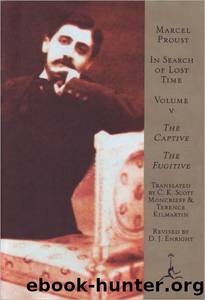In Search of Lost Time, Volume 5: The Captive, the Fugitive by Marcel Proust

Author:Marcel Proust [Proust, Marcel]
Language: eng
Format: epub
Tags: Fiction, Classics
ISBN: 9780307755377
Google: Kpu1VY8KcYcC
Barnesnoble:
Goodreads: 9598144
Publisher: Modern Library
Published: 1925-01-01T00:00:00+00:00
But I can at least assume that Baudelaire is not sincere. Whereas Dostoievsky ⦠All that sort of thing seems to me as remote from myself as possible, unless there are parts of myself of which I know nothing, for we realise our own nature only in the course of time. In Dostoievsky I find the deepest wells of insight but only into certain isolated regions of the human soul. But he is a great creator. For one thing, the world which he describes does really appear to have been created by him. All those buffoons who keep on reappearing, like Lebedev, Karamazov, Ivolgin, Segrev, that incredible procession, are human types even more fantastic than those that people Rembrandtâs Night Watch. And yet perhaps theyâre fantastic only in the same way, by the effect of lighting and costume, and are quite normal really. In any case the whole thing is full of profound and unique truths, which belong only to Dostoievsky. They almost suggest, those buffoons, some trade or calling that no longer exists, like certain characters in the old drama, and yet how they reveal true aspects of the human soul! What I find so tedious is the solemn manner in which people talk and write about Dostoievsky. Have you ever noticed the part that self-esteem and pride play in his characters? Itâs as though, for him, love and the most passionate hatred, goodness and treachery, timidity and insolence, are merely two aspects of a single nature, their self-esteem, their pride preventing Aglaya, Nastasia, the Captain whose beard Mitya pulls, Krassotkin, Alyoshaâs enemy-friend, from showing themselves in their true colours. But there are many other great qualities as well. I know very few of his books. But what a simple, sculptural notion it is, worthy of the most classical art, a frieze interrupted and resumed in which the theme of vengeance and expiation is unfolded in the crime of old Karamazov getting the poor simpleton with child, the mysterious, animal, unexplained impulse whereby the mother, herself unconsciously the instrument of an avenging destiny, obeying also obscurely her maternal instinct, feeling perhaps a combination of resentment and physical gratitude towards her violator, comes to give birth to her child in old Karamazovâs garden. This is the first episode, mysterious, grandiose, august, like the Creation of Woman in one of the sculptures at Orvieto. And as counterpart, the second episode more than twenty years later, the murder of old Karamazov, the infamy committed against the Karamazov family by the madwomanâs son, Smerdiakov, followed shortly afterwards by another act as mysteriously sculpturesque and unexplained, of a beauty as obscure and natural as the childbirth in old Karamazovâs garden, Smerdiakov hanging himself, his crime accomplished. Actually I wasnât straying as far from Dostoievsky as you thought when I mentioned Tolstoy, who imitated him a great deal. In Dostoievsky thereâs concentrated, still tense and peevish, a great deal of what was to blossom later on in Tolstoy. Thereâs that proleptic gloom of the primitives which the disciples will brighten and dispel.
Download
This site does not store any files on its server. We only index and link to content provided by other sites. Please contact the content providers to delete copyright contents if any and email us, we'll remove relevant links or contents immediately.
4 3 2 1: A Novel by Paul Auster(12375)
The handmaid's tale by Margaret Atwood(7757)
Giovanni's Room by James Baldwin(7326)
Asking the Right Questions: A Guide to Critical Thinking by M. Neil Browne & Stuart M. Keeley(5759)
Big Magic: Creative Living Beyond Fear by Elizabeth Gilbert(5754)
Ego Is the Enemy by Ryan Holiday(5413)
The Body: A Guide for Occupants by Bill Bryson(5080)
On Writing A Memoir of the Craft by Stephen King(4935)
Ken Follett - World without end by Ken Follett(4723)
Adulting by Kelly Williams Brown(4565)
Bluets by Maggie Nelson(4547)
Eat That Frog! by Brian Tracy(4526)
Guilty Pleasures by Laurell K Hamilton(4439)
The Poetry of Pablo Neruda by Pablo Neruda(4097)
Alive: The Story of the Andes Survivors by Piers Paul Read(4018)
White Noise - A Novel by Don DeLillo(4002)
Fingerprints of the Gods by Graham Hancock(3996)
The Book of Joy by Dalai Lama(3976)
The Bookshop by Penelope Fitzgerald(3844)
